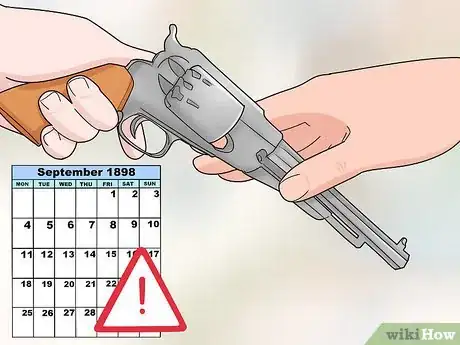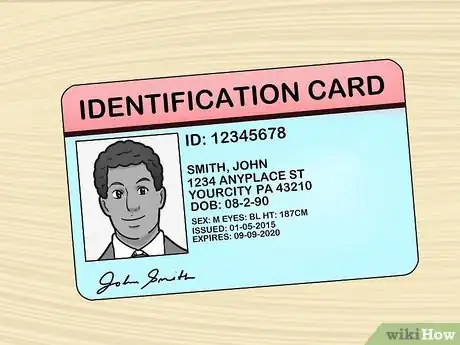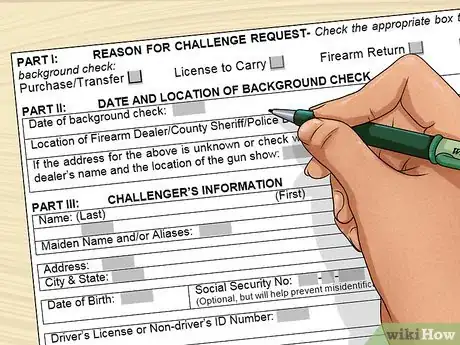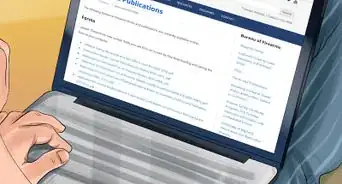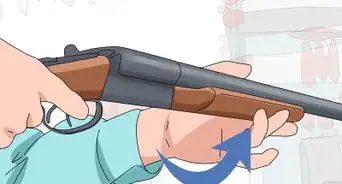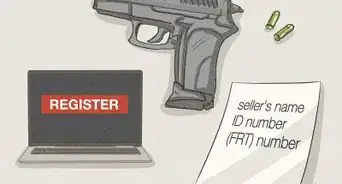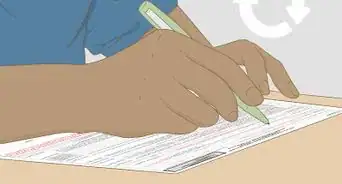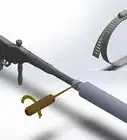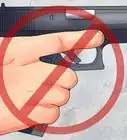This article was co-authored by wikiHow Staff. Our trained team of editors and researchers validate articles for accuracy and comprehensiveness. wikiHow's Content Management Team carefully monitors the work from our editorial staff to ensure that each article is backed by trusted research and meets our high quality standards.
There are 12 references cited in this article, which can be found at the bottom of the page.
This article has been viewed 99,150 times.
Learn more...
Pennsylvania has relatively straightforward laws when it comes to gun ownership, but there are still a few things you must do to legally transfer a gun. Not all guns need to be transferred, and not everyone is eligible to own a gun. To transfer an eligible gun, both you and the recipient need to visit a licensed dealership or sheriff’s office so the recipient can undergo a background check. Remember that you should never sell or give a gun to someone who is legally prohibited from owning one.
Steps
Determining the Eligibility of a Transfer
-
1Go through the transfer process for all types of guns except long guns. While all hand guns (like revolvers and pistols) require a background check, long guns (like rifles and shot guns) can be sold or given away directly. It is still recommended to go through the transfer process so that you have a record of the sale or transfer.
-
2Do not purchase a gun for someone who cannot legally own it. There are 38 crimes that cause someone to lose the right to own guns. These include aggravated assault, murder, rape, stalking, and unlawful restraint. It is a felony to sell or give a gun to someone who is prohibited from owning one because of prior convictions.[1]
- You can find a full list of convictions here: http://www.legis.state.pa.us/WU01/LI/LI/CT/HTM/18/00.061.005.000..HTM
- If you do not know whether someone has a conviction or not, you can wait until the dealership does a background check during the transfer. If they fail the check, do not give them the gun.
- People who have had 3 DUIs in a 5-year period may keep previously owned guns, but they not receive or buy new guns.
Advertisement -
3Avoid purchasing guns for people under the age of 18. Someone under the age of 18 may not own a gun. They may, however, use or carry a gun with the permission of a custodial parent or grandparent, as long as they are being supervised. Do not sell or transfer a gun to anyone under the age of 18.[2]
- If you’re the parent or legal guardian of the minor, you can transfer the gun to yourself. The gun belongs to you and not your minor child.
-
4Skip the transfer process if you are immediately related. You do not need to follow the standard transfer procedure if you are transferring the gun to a spouse, child, grandchild, parent, or grandparent. If you are a cousin, aunt, uncle, or unmarried partner, you must transfer the gun through a dealership.[3]
- If you knowingly give the gun to a family member who is legally ineligible to own guns, you could still be charged with a felony.
-
5Hand over the gun directly if it was manufactured before 1898. Antique guns do not need to be transferred through a dealership. This includes guns made before 1898 and replica guns with matchlock, flintlock, or percussion cap ignition systems. These antique guns can be simply sold or given away within the state.[4]
- If you’re uncertain about whether or not your gun qualifies, take it to a dealership or sheriff’s office just to be safe.
-
6Get the executor of the estate to transfer a gun from a deceased person. If a gun is being bequeathed to a family member or friend, it is the executor’s job to oversee the transfer. The executor will go to the dealership and fill out the forms as though they were the owners of the gun.[5]
- If the gun is being passed down from a parent to a child, grandparent to grandchild, or spouse to spouse, a transfer may not be necessary. Consult your local sheriff’s office for more information.
- If an executor was not named in the deceased's will, the court will appoint one.
Completing a Transfer between Private Individuals
-
1Visit a sheriff’s office or licensed gun dealership with the recipient. While you can buy a gun from an unlicensed dealer, you must go to a licensed dealership or your sheriff’s office to complete the transaction and transfer ownership. Ask to see their Federal Firearms License (FFL) to verify that they are licensed.[6]
- Both the gun's current owner and the recipient of the gun must appear together to transfer the gun.
- You must go here to transfer the gun whether you are selling or giving the gun away. Even if the sale happened at a gun show, all transfers must occur through the police or a licensed seller.
-
2Bring government-issued photo ID. A driver’s license or government employee ID both work, as long as there is a photo. Both the seller and buyer should bring their IDs with them to the dealership or sheriff’s office.[7]
-
3Fill out the required forms. The dealership will give you Form 4473 (Firearms Transaction Record) and a record of sale form, even if you are giving the gun away and not selling it. You and the seller should fill out this form together. When you are done, the dealership will process the form and submit it to the state.[8]
- These forms require a special ID that is unique to the dealership. You cannot fill out the forms before going to the dealership.[9]
- These forms also require a special number that is generated during your background check. The dealer will insert this number on the application form once the background check is completed.
-
4Run a background check on the buyer. While a permit is not necessary to own a gun in Pennsylvania, the buyer must pass a background check, called the Pennsylvania Instant Check System (PICS). This check will only take a few minutes to complete.[10]
- This check will cost $2.00 plus any processing fees that the dealership chooses to charge.
- If the recipient of the gun failed their background check, they have 30 days to fill out form SP4-197 and mail it to the Pennsylvania State Police. They can write on the form why they think the denial was unjustified. The police will respond with 60 days of receiving the form.
-
5Receive a receipt of the transfer and hand over the gun. The dealer will hand you a receipt once the process is completed. The recipient should keep this receipt in a safe place. It is proof that they followed the proper laws of transferring a gun.[11] You can then hand over the unloaded gun to the recipient.[12]
Following Gun Ownership Laws
-
1Transfer the gun’s ownership within 60 days of a conviction. If you are convicted of a crime that makes you ineligible to own a gun, you have 60 days to transfer the gun to someone else. This could be a spouse, family member, or friend. You can also try selling the gun.[13]
-
2Follow the laws of the recipient's state if they are not from Pennsylvania. If you are transferring a gun to someone in a different state, follow the transfer procedure for that state. Do not try to transfer the gun in Pennsylvania, especially if the person’s home state requires a license or permit for the ownership or transfer of guns.[14]
- Typically, you will have to go through a licensed dealership in the state where the recipient lives.
-
3Get a permit if you want to carry a concealed gun. While you do not need a permit to own or openly carry a gun, you will need 1 if you want to carry a concealed gun. Go to a local sheriff's office to fill out a License to Carry Firearms permit. The sheriff will perform another background check. If you pass, you will receive the license within 45 days.[15]
- You must be over 21 years old to receive this permit.
- You will need to pay the $2.00 background check fee again.
Community Q&A
-
QuestionHow can I transfer a gun in Pennsylvania?
 Drew Hawkins1Community AnswerStart by making sure you're eligible to make the transfer. All hand guns, which includes revolvers and pistols, require a background check, but long guns, which are guns like rifles and shot guns, can be sold or given away directly. There are 38 crimes that cause someone to lose the right to own guns including aggravated assault, murder, rape, stalking, and unlawful restraint, so never buy or sell a gun to someone who can't own it. Additionally, don't buy or sell a gun to someone under 18. If you're immediately related to the person, which means they're your spouse, child, grandchild, parent or grandparent, you can simply give or sell the gun directly to them. However, if you knowingly give the gun to a family member who is legally ineligible to own guns, you could still be charged with a felony.
Drew Hawkins1Community AnswerStart by making sure you're eligible to make the transfer. All hand guns, which includes revolvers and pistols, require a background check, but long guns, which are guns like rifles and shot guns, can be sold or given away directly. There are 38 crimes that cause someone to lose the right to own guns including aggravated assault, murder, rape, stalking, and unlawful restraint, so never buy or sell a gun to someone who can't own it. Additionally, don't buy or sell a gun to someone under 18. If you're immediately related to the person, which means they're your spouse, child, grandchild, parent or grandparent, you can simply give or sell the gun directly to them. However, if you knowingly give the gun to a family member who is legally ineligible to own guns, you could still be charged with a felony. -
QuestionCan you give a gun to a family member in PA?
 Drew Hawkins1Community AnswerYes, you can simply give a gun to an immediate family member in PA. That includes spouses, children, grandchildren, parents, or grandparents. However, if you're distantly related you have to transfer the gun through a dealership. So if they're your cousin, aunt, uncle, or unmarried partner, you've got to go to a dealership in order to properly complete the transfer. However, even if you're immediately related, if your relative committed a crime that prevents them from owning a gun, you can't give one to them. If you do, you could be charged with a felony.
Drew Hawkins1Community AnswerYes, you can simply give a gun to an immediate family member in PA. That includes spouses, children, grandchildren, parents, or grandparents. However, if you're distantly related you have to transfer the gun through a dealership. So if they're your cousin, aunt, uncle, or unmarried partner, you've got to go to a dealership in order to properly complete the transfer. However, even if you're immediately related, if your relative committed a crime that prevents them from owning a gun, you can't give one to them. If you do, you could be charged with a felony. -
QuestionCan my dad buy me a handgun?
 Drew Hawkins1Community AnswerAccording to Federal Law, you can't buy a handgun if you're under 21 years old. However, you can be gifted a handgun if you're under 21. But, you need to be careful that you don't do what's called a "straw purchase" which means you give your did money to buy a gun for you, which is technically illegal. Instead, your dad can buy the handgun and give it to you as a gift. Check with your local laws about whether or not you're allowed to have a handgun to be sure before your dad buys one, though.
Drew Hawkins1Community AnswerAccording to Federal Law, you can't buy a handgun if you're under 21 years old. However, you can be gifted a handgun if you're under 21. But, you need to be careful that you don't do what's called a "straw purchase" which means you give your did money to buy a gun for you, which is technically illegal. Instead, your dad can buy the handgun and give it to you as a gift. Check with your local laws about whether or not you're allowed to have a handgun to be sure before your dad buys one, though.
References
- ↑ http://www.legis.state.pa.us/cfdocs/legis/LI/consCheck.cfm?txtType=HTM&ttl=18&div=0&chpt=61&sctn=11&subsctn=0
- ↑ http://www.psp.pa.gov/Documents/Public%20Documents/SP4-135_Information_Firearm_Purchasers_and_Safety-PG-2-10-2008.pdf
- ↑ http://www.legis.state.pa.us/cfdocs/legis/LI/consCheck.cfm?txtType=HTM&ttl=18&div=0&chpt=61&sctn=11&subsctn=0
- ↑ http://www.legis.state.pa.us/cfdocs/legis/LI/consCheck.cfm?txtType=HTM&ttl=18&div=0&chpt=61&sctn=11&subsctn=0
- ↑ https://www.atf.gov/firearms/docs/transfers-national-firearms-act-firearms-decedents-estates/download
- ↑ http://www.legis.state.pa.us/cfdocs/legis/LI/consCheck.cfm?txtType=HTM&ttl=18&div=0&chpt=61&sctn=11&subsctn=0
- ↑ http://www.legis.state.pa.us/cfdocs/legis/LI/consCheck.cfm?txtType=HTM&ttl=18&div=0&chpt=61&sctn=11&subsctn=0
- ↑ https://www.atf.gov/firearms/docs/4473-part-1-firearms-transaction-record-over-counter-atf-form-53009/download
- ↑ http://www.psp.pa.gov/firearms-information/Pages/Firearms-Forms.aspx
- ↑ http://www.psp.pa.gov/Documents/Public%20Documents/SP4-135_Information_Firearm_Purchasers_and_Safety-PG-2-10-2008.pdf
- ↑ http://www.legis.state.pa.us/cfdocs/legis/LI/consCheck.cfm?txtType=HTM&ttl=18&div=0&chpt=61&sctn=11&subsctn=0
- ↑ http://lawcenter.giffords.org/waiting-periods-in-pennsylvania/
- ↑ http://www.psp.pa.gov/Documents/Public%20Documents/SP4-135_Information_Firearm_Purchasers_and_Safety-PG-2-10-2008.pdf
- ↑ https://www.nssf.org/giving-a-firearm-as-a-gift-some-reminders-from-nssf/
- ↑ http://www.psp.pa.gov/firearms-information/Pages/Carrying-Firearms-in-Pennsylvania.aspx
About This Article
If you’re in Pennsylvania and need to transfer your gun ownership, you’ll need to visit a licensed dealership or sheriff’s office to make it official. Both you and the person you’re selling your gun to must be present, and you’ll both need to bring your IDs. When you arrive, the person you’re selling to will need to fill out a background check form and then you’ll both need to fill out a gun sale form. The background check costs 2 dollars and usually processes within a few minutes. Once they pass, you can hand over the unloaded gun to the recipient. Just make sure to ask for a receipt of transfer for your records before doing so. To learn how to get a permit for a concealed weapon, read on!




